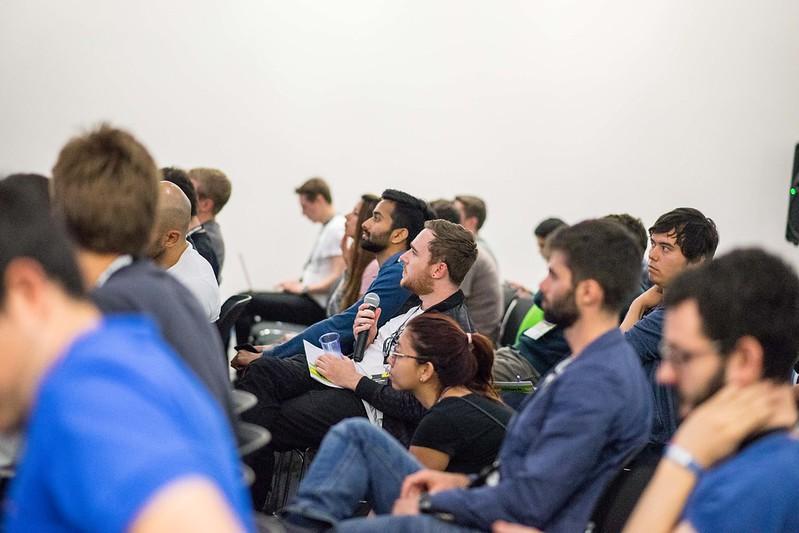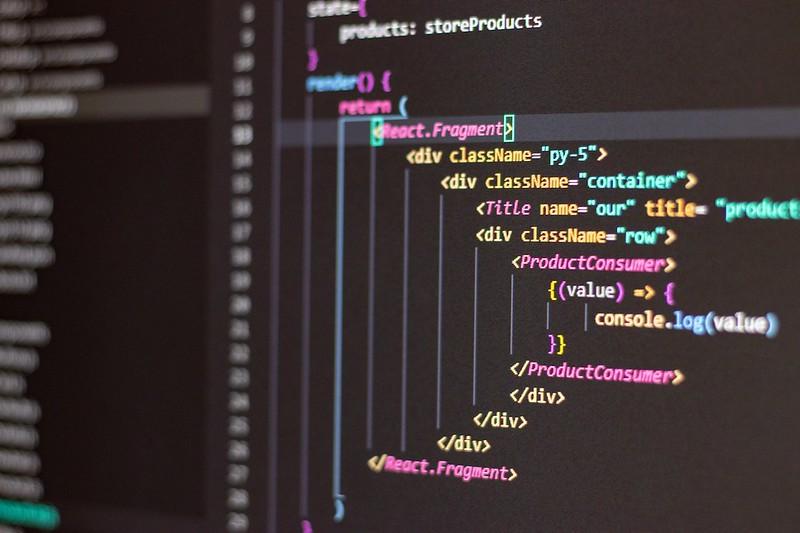If you are interested in JavaScript, my guide on how to become a JavaScript dev is sure to come in handy. If you don’t have a mentor, you might not know where to start and what to note during the process.
To make it easier for young people on their career path, I have compiled this 7-step guide. Thus, please refer to my sharing below!
Who Is A JavaScript Developer?
A JavaScript developer is someone who creates and improves websites using a computer language called JavaScript. There’re three JavaScript developer types:
- Front-end devs
- Back-end devs
- Full-stack devs

With this language, they can add animations or helpful features like search boxes to websites. So people can use them more easily.
Some developers focus on making the parts of a website that people can see and click on (front end), like buttons and images. Others work on the hidden parts (back end) that make the website run smoothly, like databases and servers.
What Does A JavaScript Developer Do?
Front-end, back-end, and full-stack developers will have different tasks. Basically, their duties include:
- Front-end devs: Use libraries and frameworks to build UIs, and design responsive layouts to ensure the website looks good on phones, tablets, and computers.
- Back-end devs: Build server-side applications, handle data, manage databases, and ensure smooth communication between the front end and the back end.
- Full-stack devs: Handle front-end and back-end tasks.
Besides the specific tasks above, a JavaScript developer has the basic tasks:
- Use JavaScript syntax and concepts to create clean and efficient code.
- Create scripts to add interactive elements to websites and apps.
- Test code and fix pugs.
- Optimize apps and websites.
- Talk to designers, other devs, and managers to ensure everyone is on the same page.
- Learn new things.
- Update websites and apps to make them faster or add new features that people will like.
In short, a JavaScript developer’s daily tasks revolve around writing and maintaining code.
How To Become A JavaScript Developer?
The most important thing to become a JavaScript developer is to master JavaScript. Besides, you need skills and work experience to increase your opportunities. I will walk you through each step of the process.
Step 1: Earn A Degree
While it’s true that not all successful developers have formal degrees, a degree helps you learn the basic skills needed and teaches you many programming parts to make you a better developer overall.
Here are some majors you should consider pursuing to get this job:
- Computer Science
- Software Engineering
- Web Development
- Information Technology (IT)
- Computer Engineering
When you’re in the university or college, I recommend connecting with professors, classmates, and pros in the field to build your network.
In this process, try making your websites and learning from online tutorials. I always recommend young people to self-study because it shows their passion and effort.
Step 2: Earn Certifications

Getting certifications in JavaScript is a smart move to grow if you want to become a developer. While not always a strict requirement, they can demonstrate your expertise, dedication, and commitment to the field.
To start, find good places to get certified. Then, look for ones that match what you want to learn and are updated. Here’re some examples:
- FreeCodeCamp Certifications
- Google Associate Android Developer (AAD) Certification
- Microsoft Certified: Azure Developer Associate
Remember to research each certification’s content, prerequisites, and benefits to find the one that aligns with your goals and interests as a JavaScript developer.
Step 3: Find A Mentor
Finding a mentor is needed because this person can show you the best ways to learn and give you tips that make things easier.
They can help you based on what you’re good at and what you need to learn more about. Also, they know other people in this field. So they might help you find jobs or new quality relationships.
When you hit roadblocks or feel discouraged, a mentor can cheer you on and help you keep going.
Before finding a mentor, the first thing you need to do is to figure out what parts of coding you want to learn, like making websites or apps. So, where to find this person?
- Attend meetups, workshops, conferences, and online forums related to JavaScript. These platforms are great for connecting with potential mentors.
- Join coding communities like GitHub, Reddit, and Stack Overflow to seek advice from experienced developers.
- Follow influential developers on platforms like Twitter and LinkedIn. They often share insights and may be open to mentoring.
Once you identify potential mentors, approach them respectfully. Then, explain your goals and why you’re interested in their guidance. Some mentors might be busy, so don’t be upset if they can’t help right away.
In this step, my advice is to be ready to learn, ask questions, and be receptive to feedback. Remember to be thankful for their help and time.

Step 4: Develop Your Skills
Technology changes, so improving skills helps you keep up with new things in this field. Learning more makes you stand out to employers, making you different from others. As a result, you can find better jobs and earn more money.
Here are some technical skills you need to get this job:
- JavaScript basics: You need to know how to use JavaScript, like how to write code and use different types of information.
- HTML and CSS: These are like the building blocks of websites. You should know how to make things look good and put them in the right places.
- Front-end tools: Familiarity with tools like React, Angular, or Vue.js can help you create the parts of websites that people interact with.
- Git and sharing code: You’ll need to use Git to work with others and keep track of changes in your code.
- AJAX and APIs: Know these things to fetch and display data from external sources.
- Testing and debugging: You’ll need to be good at finding bugs in your code and fixing them.
- Using Browser tools: Browser tools can help you understand what your code is doing and fix issues.
Besides these hard skills, you need soft skills, such as:
- Problem-solving
- Critical thinking
- Communication
- Adaptability
- Teamwork
- Time management
Remember, these skills come with practice and time. You can learn from tutorials and books and by trying things out yourself.

Step 5: Gain Work Experience
Work experience helps you learn by actually doing tasks, which is better than just studying. You’ll be more confident in your skills when you work on real projects.
Besides, you can meet other developers and learn from them while working. Hence, you get better at fixing real problems coming up.
You can start with an intern role, a freelance job, or open-source projects:
- Internships: Look for companies, startups, or organizations that offer internships for this job. You learn while helping out.
- Freelance work: Sign up on freelance platforms like Upwork, Freelancer, or Fiverr. Browse through job listings and apply for projects that match your skills.
- Open source projects: Explore projects on platforms like GitHub. Then, pick the ones that interest you and align with your skill level.
In this process, don’t be afraid to ask more experienced people for advice or feedback. Remember, every bit of experience helps. The more you work, the better you become as a JavaScript developer.
Step 6: Build Your Resume
You can stand out among other candidates when applying for jobs with a strong resume. So what do you need to include in it?
- Contact information: Include your name, email address, phone number, and LinkedIn profile.
- Summary or objective: Write a short statement highlighting your passion for this field and briefly mentioning your skills.
- Skills: Create a section that lists your JavaScript skills, frameworks, and other relevant abilities.
- Education: Mention your educational background, including your degree, major, and the institution’s name.
- Projects: Include project names, descriptions, and any technologies used.
- Experience: If you’ve had internships, freelance work, or related jobs, describe your role and achievements in bullet points.
- Certifications: If you’ve completed any relevant online courses or certifications, list them to show your commitment to learning.
Besides the important information above, employers also pay attention to how you present your resume. Here’re my tips for creating a resume:
- Clarity: Keep your resume clear and easy to read. Use bullet points and short sentences.
- Tailor to the job: Customize your resume for each job, focusing on the skills and experience that match the job.
- Quantify achievements: Whenever possible, use numbers or data to show the impact of your work (e.g., “Built an interactive website that increased user engagement by 30%”).
- Proofread: Check for grammar and spelling errors.
Remember, a well-crafted resume is your tool to show your potential as a JavaScript developer and make a positive impression on employers.
Step 7: Find A Job

When finding and applying for this position, consider jobs that align with your skills and goals. Typically, you’ll have an interview after successfully applying. To prepare for interviews, I recommend:
- Practicing coding challenges
- Reviewing JavaScript concepts
- Being ready to discuss your projects and experience
During interviews, you should show your passion for this field and your willingness to learn. Remember, finding a job is a journey. Each step you’ve taken brings you closer to landing a JavaScript developer role.
Tips to Become a JavaScript Dev
To make it easier for you to get this job, I’ll share some tips that I’ve gathered based on my experience.
- Start with a strong foundation in JavaScript basics, including variables, data types, functions, and loops.
- Consistent practice is key. Code every day, work on projects and engage with coding challenges to hone your skills.
- Apply what you learn by building real projects. Whether it’s a simple to-do app or a more complex website, practical experience is invaluable.
- Study open-source projects on GitHub to see how experienced developers structure their code and handle different cases.
- Embrace a growth mindset. Keep learning about new JavaScript features, libraries, and trends to stay relevant.
- Connect with other developers through online forums, social media, and coding events.
- Don’t be discouraged by errors or challenges. Learning from mistakes is a natural part of growth.
- Use online resources like tutorials, coding platforms, and courses to enhance your knowledge.
Once you master these tips, your career path will definitely be easier!
Salary and Job Outlook
In 2023, the average total pay for a JavaScript developer is around $117,850 per year, including:
- A base pay of $91,417/year
- Additional income of about $15,430/year
The overall outlook for software developers, which includes JavaScript devs, is expected to grow by 26 percent from 2021-2031. This growth suggests an increasing demand for skilled people.
The combination of competitive salaries and a positive job outlook makes this career appealing for those interested in coding and technology.
Can JavaScript Be Self Taught?
Absolutely! You can learn JavaScript by yourself. Many of my colleagues have succeeded in this field simply by self-taught using free online lessons and practicing writing code.
Yet, self-learning requires dedication, consistent practice, and a willingness to tackle challenges. Also, you will not have a specific learning path like when you study in classes.
Personally, I find self-study much more challenging than participating in formal programs. Thus, consider your abilities and choose the right learning path!
Is JavaScript Easy For A Beginner?
Sure! JavaScript is easy for beginners because it’s like writing sentences in English. You can see what you do right away in a web browser.

But, as you learn more, some parts can get a bit harder, like working with object-oriented programming or asynchronous operations.
Still, if you take your time, practice, and use online lessons, you can learn step by step. Many online tutorials and resources are available to make the learning process easier for newcomers to programming.
Conclusion
Above are my specific guides on how to become a JavaScript developer. Like any other job, you need a solid education and master the needed skills to get the job. Also, work experience is vital if you want to impress employers.
Remember that whether or not you successfully apply for this position depends on your efforts and determination. I believe my sharing will help you in this process! Good luck!
